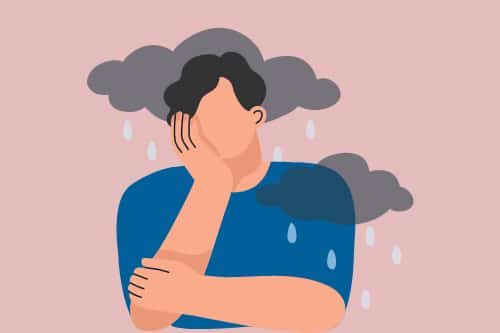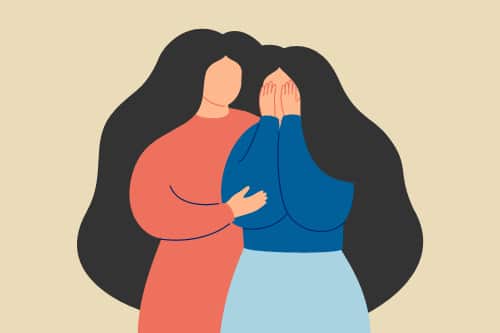How to Grieve the Loss of a Loved one to Covid-19?
S Sharanya
July 2, 2025
S Sharanya
July 2, 2025
Summary: You could be angry, irritated, helpless to have not had the chance to say goodbye. The passing of your loved one could have been possibly sudden and this can be overwhelming. Dealing with a loss of a loved one at any time can be distressing and even more so during the pandemic. We understand how difficult it can be to lose someone we love and we are here to help you grieve the loss of a loved one to COVID-19 by adopting meaningful grieving practices.
Everybody processes the loss of a loved one differently. That being said, everybody’s way of addressing and grieving a loss is completely subjective and normal. The nature of the virus is especially contagious, thus saying goodbye in person is not possible. This leaves most of us in a state of distress as we do not get the time to process and get closure, which has increasingly caused a rise in depression and anxiety.
We are here to help you understand the process of grieving the loss of a loved one and how important it is to grieve, especially at an overwhelming time like this.

According to the American Psychological Association, grief can be explained as an intense emotional and physical reaction that an individual experiences following the death of a loved one. You may experience the following:

This is by far the most natural coping mechanism we go by. Our first reaction to facing a loss of a loved one is shock and lack of acceptance of them passing away. This is also the stage where we ask ourselves existential questions and perceive the world to be completely meaningless. We may also experience a feeling of numbness, and the goal is to simply push through the days.
This falls under the spectrum of primitive emotions from infancy, and this emotion is also familiar to all of us. While grieving this phase is very important. The more you begin to feel angry, the more your anger dissipates, and the more you will heal. You could also question your school of faith, which means you are in pain. Anger can be quite helpful if you set a structure to it and let it help you grieve as an anchor.
In this phase of grief, you ask a lot of “What if” questions. “What if I had tried harder” “What if I never went out” etc… During this phase, guilt will also accompany you. You can see yourself shifting away from what-ifs and if only. Losing a loved one is a depressing phase, and it is completely normal to feel the way you do.
In this stage, empty feelings present themselves and you could be feeling very low on energy. You would think that this phase is permanent, and it may show up in your professional and personal life. Although this phase does not mirror the clinical symptoms of depression, it is important to be mindful of distressing symptoms and reach out for help.
In this phase of grief, acceptance does not mean that it is all okay or that you have completely healed from it. It only means that you can rationalize what has happened. It is believed that you can never completely accept their passing away but will eventually try to find meaning in the loss slowly.
Although the above mentioned are listed down chronologically, it is not assured to follow the same pattern. Sometimes, you could experience all of these phases at once. That is when it is extremely important to use coping mechanisms and seek professional help immediately.

Some process the loss by crying about it, some by talking about them, some bury themselves at work, etc. so it is extremely important to understand your way of processing guilt and do not let others decide on how you should grieve
It is okay to weigh in your feelings and address it only when you are ready. If you feel judged by any family member or you feel your support system may not be able to relate with you as much, then stick to talking to a professional who will help you address your grief.
You must have heard people ask you to, “Be strong for your family”. You truly do not have to feel pressured to stay strong. Being vulnerable may help you grieve better.
You will realise your true support system at a time of distress. These could be people you have grown up with or have never been in touch with. Be open and allow people to come in so you can lean on them.
It is completely okay to break down and not attach any meaning to it. If you are feeling emotional, it is okay to be vulnerable, and this in turn will help you heal.
Replaying fond memories will help you stay connected to them and it may also help you identify that one trait your loved one had. This will be a good indicator to promote the positive pockets of happiness.
Choose any trait of your loved one for eg: to be kind to others, follow this as golden rule. Doing this simple step will help you carry forward the legacy and manifest pockets of positivity.
Watch out for thoughts and behaviors that derail you from your healing process and take action immediately before it gets out of control.
If you fail at all the above steps , seek professional help immediately.
A. We are extremely sorry that you are experiencing this and it is not fair. Experiencing low moods is normal and to be expected at a time like this. But if you are having disturbing thoughts and harmful ideations, reach out to our therapists immediately.
A. This may be an extremely painful experience and we can’t fathom the extent of pain and distress you are enduring. It is best to open up and talk to people you feel most comfortable with or simply tap the link above and let a professional help you through this trying time.
A. Drawing boundaries for your mental peace is extremely important. You can start by saying “Thank you. I appreciate it and I will grieve when I’m ready.”
